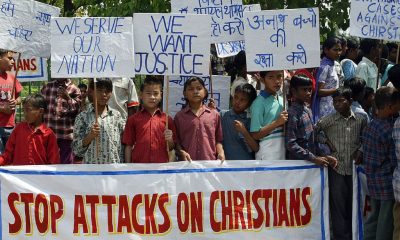world news
Christian teens charged with blasphemy in Pakistan, could face death penalty
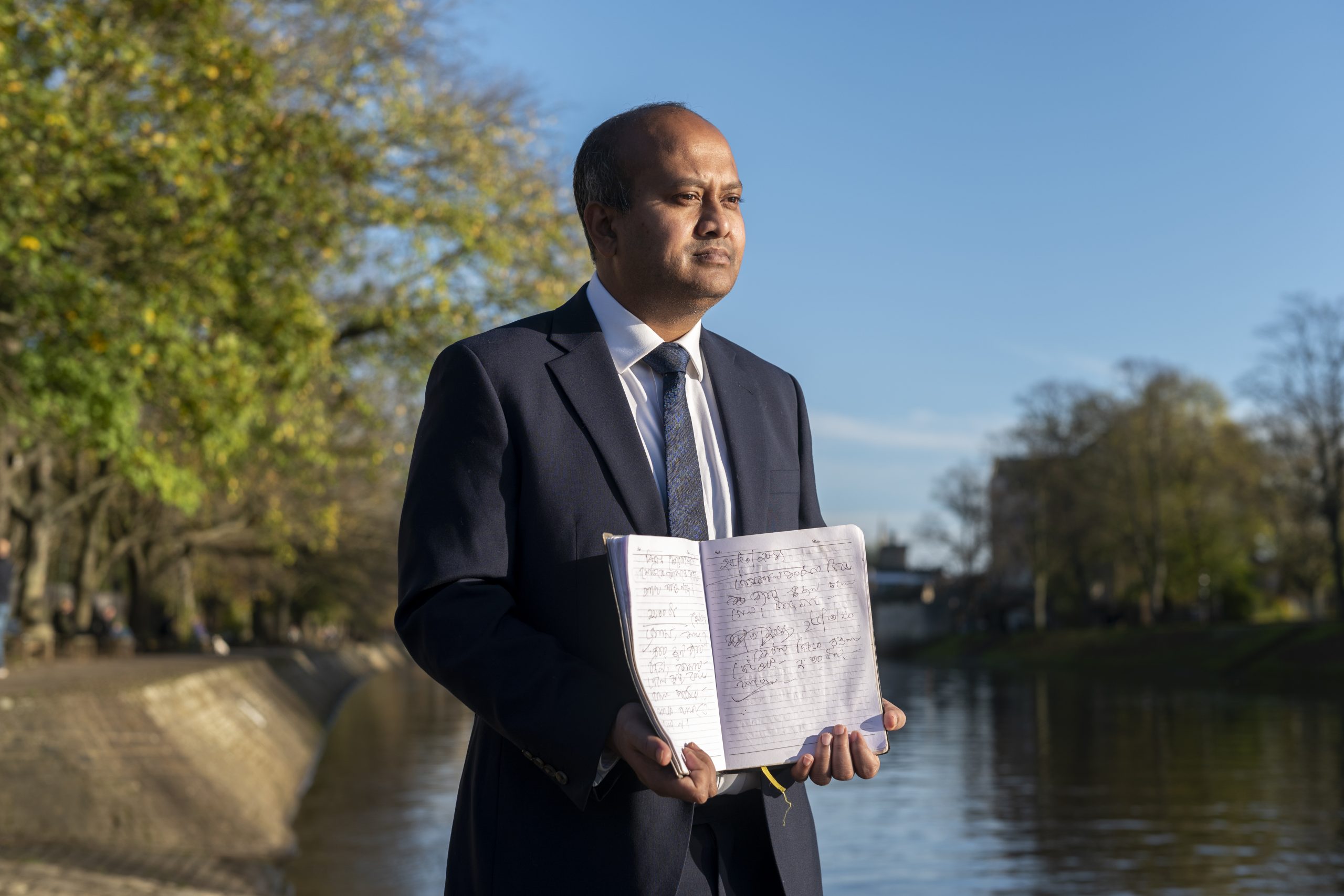
Pakistan — Babar Sandhu Masih was resting after lunch last Thursday afternoon when he heard a commotion outside his house in the Qurban Lines neighborhood of Lahore, Pakistan.
Masih went outside to find his neighbor, policeman Zahid Sohail, beating his son and another Christian boy. His son Adil, 18, and 14-year-old Simon Nadeem Masih, who lives nearby, had been engaged in light-hearted banter when Sohail accused them of committing blasphemy, he said.
“Sohail initially alleged that he was walking past the two boys when he overheard them ‘disrespecting’ prophet Muhammad and then laughing over it,” Masih said. “He started beating Simon, and when Adil tried to save him, Sohail attacked him too.”
Masih, a Catholic who paints cars at a local auto workshop, said neighbors soon gathered, and Sohail repeated his accusations.
“Both boys flatly denied Sohail’s allegation and said they had said nothing that involved a mention of the Muslim prophet,” Masih told Morning Star News. “When local elders of the neighborhood asked Sohail to substantiate his accusation, he failed to satisfy them and left.”
The father of four children, Adil being the youngest, said that Race Course police station officers raided his house later that evening and arrested Adil. They also took Simon into custody, saying that Sohail had registered a case against the two under blasphemy statutes.
“We were shocked to learn the contents of the First Information Report [FIR] in which Sohail alleged that Simon had called a puppy ‘Muhammad Ali,’ and both boys then joked about it,” Masih said.
They were charged with blaspheming Muhammad under Section 295-C of Pakistan’s blasphemy statutes, which calls for the death penalty. Muhammad Ali is a common name in Pakistan, the first name attributed to Islam’s prophet and the last to Hazrat Ali, Muhammad’s son-in-law and the fourth caliph.
Masih said the allegation was “completely baseless,” as Sohail had made no mention of a puppy when he first raised the issue.
“No one in our street has dogs, and neither was there a puppy in the street when this incident took place,” he said. “Sohail cooked up a false accusation against our children after failing to convince the locals about his earlier allegation.”
Masih said that his wife was a heart patient and also has suffered two strokes.
“She doesn’t know yet that Adil has been arrested on such a serious charge, and I don’t know how long I’ll be able to withhold this news from her,” he said on Thursday. “She’ll be devastated.”
Adil left school a few years ago and was training with him to become a car painter, he said.
“I was able to meet Adil briefly on Friday, when police brought him to the court for obtaining the boys’ judicial remand,” Masih told Morning Star News. “Both boys were in a state of shock and fear and are still unable to understand why Sohail had gotten them arrested.”
At least 500 Christian families live in the Qurban Lines neighborhood, and there had been no religious tension in the area in years, he said.
“Sohail does not have a good reputation in the locality, which is why many locals did not take his allegation seriously,” Masih said. “Our Muslim neighbors have known us for years, and they know we would never indulge in anything that could hurt their religious sentiments.”
Police should have investigated the veracity of the allegation before arresting Adil and Simon, he said.
“Now we don’t know how long our children will be made to suffer in prison due to this false charge — this is sheer injustice,” Masih said.
Napolean Qayyum of the Pakistan Center for Law and Justice said that they were helping the two families in arranging legal support for their children.
“The FIR registered by the complainant reeks of mala fide, yet the police showed traditional haste in arresting the two boys,” he said. “We are hoping that the boys will be released on bail soon.”
False accusations
Several people have been lynched over false accusations of blasphemy in Pakistan.
At least 57 cases of alleged blasphemy were reported in Pakistan between Jan. 1 and May 10, while four blasphemy suspects were lynched or extrajudicially killed during the same period, according to the Lahore-based Center for Social Justice and People’s Commission for Minorities Rights (PCMR).
The data shows that eight incidents occurred in January, a significant increase to 17 cases in February, seven cases in March, another surge to 19 cases in April, and six cases in May (up to the 10th), totaling 57 accused individuals.
The highest number of blasphemy cases, 28, were reported in Punjab Province, followed by Sindh Province with 16, Khyber Pakhtunkhwa with eight, and Azad Jammu and Kashmir with five.
In response to these alarming figures, retired Justice Nasira Javaid Iqbal, the patron-in-chief of PCMR, urged the government to stop the misuse of the harsh laws.
“The blasphemy laws have been consistently misused to settle personal disputes, persecute minority groups, and incite mob violence and hatred,” she said in a press statement. “We demand prompt action and a collective effort by the government to address these human rights violations.”
Last week, a court released on bail a Christian woman charged with blasphemy after she and a Muslim co-worker were accused of intentionally burning papers containing Quranic verses.
Mussarat Bibi, 45, and Muhammad Sarmad worked at the Government Girls Higher Secondary School in 66-EB village, Arifwala tehsil of Pakpattan District. On April 15, both workers were told to clean the school’s storeroom filled with paper and other scrapped items. The duo reportedly gathered the wasted paper and other scraps in a corner of the school and set them on fire. Some students later noticed that the burnt items also contained holy pages.
They were charged under Section 295-B of the blasphemy statutes and sent to Pakpattan Jail on judicial remand. Section 295-B states, “Whoever willfully defiles, damages or desecrates a copy of the Quran or of an extract therefrom or uses it in any derogatory manner or for any unlawful purpose shall be punishable with imprisonment for life.”
They were released from prison on bail on May 13.
Pakistan ranked seventh on Open Doors’ 2023 World Watch List of the most difficult places to be a Christian, up from eighth the previous year.
Sources:Christian Post
world news
പാക്ക് ക്രൈസ്തവര് നേരിടുന്നത് കടുത്ത പീഡനം; സംരക്ഷണം ഉറപ്പാക്കാന് ഭരണകൂടം തയാറാകണമെന്ന് സന്നദ്ധ സംഘടന
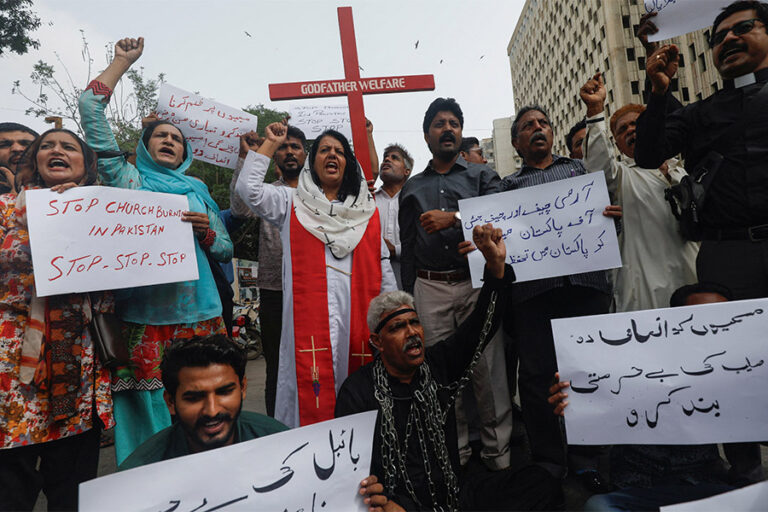
ലാഹോർ: പാക്കിസ്ഥാനിലെ ക്രൈസ്തവരുടെ സംരക്ഷണം ഉറപ്പാക്കാൻ ഫെഡറൽ, പ്രവിശ്യാ സർക്കാരുകള് തയാറാകണമെന്ന് സന്നദ്ധ സംഘടനയായ ഡിഗ്നിറ്റി ഫസ്റ്റ്. കഴിഞ്ഞ ഓഗസ്റ്റിൽ പഞ്ചാബിലെ ജരൻവാലയിൽ ക്രിസ്ത്യൻ സമൂഹത്തിന് നേരെ നടന്ന ആക്രമണത്തിന് ശേഷം, 2024 വർഷത്തിൻ്റെ ആദ്യ പകുതിയിൽ ക്രിസ്ത്യാനികൾക്കെതിരായ അക്രമവും വിദ്വേഷവും വര്ദ്ധിക്കുന്നതിനാണ് സാക്ഷ്യം വഹിച്ചതെന്ന് സംഘടന ചൂണ്ടിക്കാട്ടി. ഡിഗ്നിറ്റി ഫസ്റ്റ് ‘പെർസിക്യൂഷൻ വാച്ച്’ എന്ന പേരില് പുറത്തിറക്കിയ റിപ്പോർട്ടില് ആക്രമണങ്ങൾ, കൊലപാതകങ്ങൾ, പീഡനങ്ങൾ, തട്ടിക്കൊണ്ടുപോകലുകൾ, ലൈംഗികാതിക്രമങ്ങൾ, നിർബന്ധിത മതപരിവർത്തനം, ക്രിസ്ത്യാനികൾക്കെതിരായ മതനിന്ദ ആരോപണങ്ങൾ, ഭൂമി തട്ടിയെടുക്കൽ, കുടിയൊഴിപ്പിക്കൽ തുടങ്ങീ ക്രൈസ്തവര്ക്ക് നേരെ വിവിധങ്ങളായ ആക്രമണങ്ങളാണ് അരങ്ങേറുന്നതെന്ന് സംഘടന പറയുന്നു.
ജനുവരി മുതൽ ജൂൺ വരെ കഴിഞ്ഞ ആറ് മാസത്തിനിടെ നടത്തിയ ആക്രമണങ്ങള് ഭയാനകമാണെന്നും, സംരക്ഷണം ഉറപ്പാക്കാൻ ഭരണകൂടം അടിയന്തര പ്രായോഗിക നടപടികൾ സ്വീകരിക്കണമെന്നും ഡിഗ്നിറ്റി ഫസ്റ്റ് എക്സിക്യൂട്ടീവ് ഡയറക്ടർ യൂസഫ് ബെഞ്ചമിൻ മാധ്യമങ്ങളോട് പറഞ്ഞു. ആറ് മാസത്തിനുള്ളിൽ ക്രൈസ്തവര്ക്ക് നേരെ എഴുപതിലധികം ആക്രമണങ്ങൾ ഉണ്ടായിട്ടുണ്ടെന്നും ഇത് നൂറ്റിനാല്പ്പതിലധികം ക്രിസ്ത്യൻ കുടുംബങ്ങളെ ബാധിച്ചതായും ബെഞ്ചമിൻ വെളിപ്പെടുത്തി.
പഞ്ചാബ് പ്രവിശ്യയിൽ മാത്രം അഞ്ച് അക്രമ ആക്രമണങ്ങളാണ് ഉണ്ടായത്. ഇവയില് 3 എണ്ണം ക്രിസ്ത്യൻ കുടുംബങ്ങളെയും 2 ആക്രമണം പള്ളികളെ ലക്ഷ്യമാക്കിയായിരിന്നുവെന്നും അദ്ദേഹം ചൂണ്ടിക്കാട്ടി. ക്രൈസ്തവര് ജോലി മേഖലയിലും വിദ്യാഭ്യാസ മേഖലയിലും പിന്തള്ളപ്പെടുന്നുണ്ട്. ക്ലീനിംഗ് ജോലികൾക്ക് ‘ക്രിസ്ത്യാനികൾക്ക് മാത്രമേ’ അപേക്ഷിക്കാനാകൂ എന്ന വിവേചനപരമായ തൊഴിൽ പരസ്യം ഖൈബർ പഖ്തൂൺഖ്വയിലെ പത്രങ്ങളിൽ പ്രസിദ്ധീകരിച്ചതും സംഘടന ചൂണ്ടിക്കാട്ടുന്നു.
8 ക്രിസ്ത്യൻ ആരോഗ്യ പ്രവർത്തകർക്കു ജോലിസ്ഥലത്ത് വിവേചനം നേരിടുകയും സുരക്ഷാ കിറ്റുകളുടെ അഭാവം മൂലം ജീവൻ നഷ്ടപ്പെടുകയും ചെയ്തു. എട്ടോളം ക്രിസ്ത്യൻ പെൺകുട്ടികളെ തട്ടിക്കൊണ്ടുപോയി ലൈംഗികമായി ചൂഷണം ചെയ്ത ശേഷം നിർബന്ധിത മതപരിവർത്തനം നടത്തിയതായി ഡിഗ്നിറ്റി ഫസ്റ്റ് ശേഖരിച്ച വിവരങ്ങൾ വെളിപ്പെടുത്തുന്നു. ഇവരുടെ പ്രായം 11നും 16നും ഇടയിലാണെന്നതാണ് ശ്രദ്ധേയമായ വസ്തുത. പെണ്കുട്ടികളില് 7 പേർ പഞ്ചാബിൽ നിന്നും 1 പേർ സിന്ധിൽ നിന്നുമാണ്. ലാഹോറിൽ ഇസ്ലാം മതം സ്വീകരിക്കാൻ വിസമ്മതിച്ചതിനെ തുടർന്ന് 13 വയസ്സുള്ള ക്രിസ്ത്യൻ ബാലനെ വിഷ പദാർത്ഥം കഴിക്കാൻ നിർബന്ധിച്ചുവെന്നും സംഘടന റിപ്പോര്ട്ടില് വെളിപ്പെടുത്തുന്നുണ്ട്.
കടപ്പാട് :പ്രവാചക ശബ്ദം
world news
കോംഗോയിൽ ഭീകരാക്രമണം; 3 ക്രൈസ്തവർ കൊല്ലപ്പെട്ടു
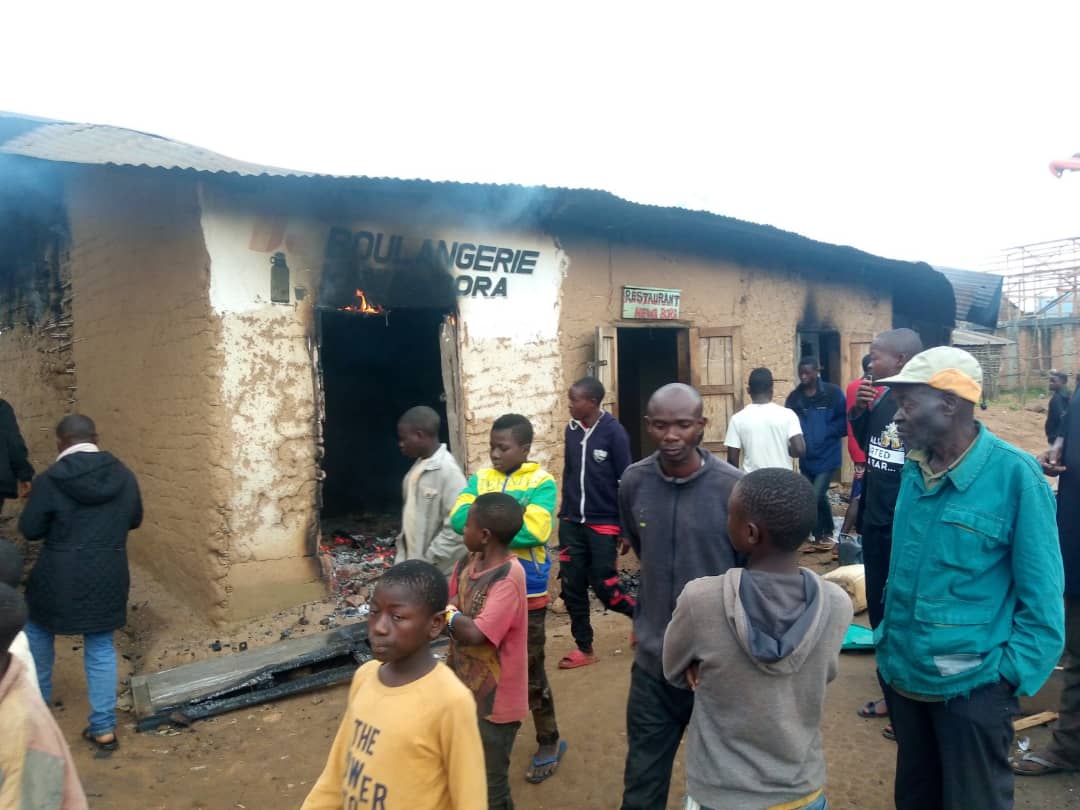
കോംഗോ : കോംഗോയിലെ മാമോവിന് സമീപമുള്ള ഒരു ക്രിസ്ത്യൻ ഗ്രാമത്തിനു നേരെയാണ് ഇസ്ലാമിസ്റ്റ് അലൈഡ് ഡെമോക്രാറ്റിക് ഫോഴ്സ് എന്ന ഭീകരവാദികൾ ആക്രമണം നടത്തിയത്. ആക്രമണത്തിൽ മൂന്ന് ക്രൈസ്തവർ കൊല്ലപ്പെട്ടു. നിരവധി പേരെ ഭീകരർ തട്ടിക്കൊണ്ടുപോകുകയും ചെയ്തു.
ജൂലൈ 16-ന് രാത്രിയാണ് ആക്രമണം ഉണ്ടായത്. ആക്രമണത്തിൽ ഏഴ് വീടുകൾ കത്തിനശിച്ചു. പ്രദേശവാസികളോടും ചുറ്റുമുള്ള സമൂഹങ്ങളോടും ജാഗ്രത പാലിക്കാൻ ആംഗ്ലിക്കൻ ചർച്ച് ഓഫ് ബെനിയുടെ ബിഷപ്പ് ആഹ്വാനം ചെയ്തു.
Sources:christianlive
world news
ടൂറിസ്റ്റുകൾക്ക് ആരോഗ്യഇൻഷൂറൻസ് പദ്ധതിയുമായി യു.എ.ഇ

ദുബൈ: ടൂറിസ്റ്റുകൾക്ക് ആരോഗ്യഇൻഷൂറൻസ് പദ്ധതിയുമായി യു.എ.ഇ. രാജ്യത്തെ ഫെഡറൽ അതോറിറ്റി ഫോർ ഐഡന്ററി, സിറ്റിസൻഷിപ്പ്, കസ്റ്റംസ് ആൻഡ് പോർട്ടാണ് (ICP) രാജ്യത്ത് ടൂറിസ്റ്റുകളായി എത്തുന്നവർക്ക് ആരോഗ്യ ഇൻഷൂറൻസ് ലഭ്യമാക്കാൻ പുതിയ പദ്ധതി നടപ്പാക്കുന്നത്. യു.എ.ഇ സന്ദർശിക്കാൻ വിസക്ക് അപേക്ഷിക്കുമ്പോൾ തന്നെ ആരോഗ്യ ഇൻഷൂറൻസിനും അപേക്ഷ നൽകാൻ ICP യുടെ വെബ്സൈറ്റിലും, മൊബൈൽ ആപ്ലിക്കേഷനിലും സൗകര്യമുണ്ടാകും. ഇൻഷൂറൻസ് തുക, മറ്റ് സേവന മാനദണ്ഡങ്ങൾ എന്നിവ രാജ്യത്തെ പ്രമുഖ ഇൻഷൂറൻസ് കമ്പനികളുമായി ചേർന്നാണ് നടപ്പാക്കുകയെന്ന് ഫെഡറൽ അതോറിറ്റി അറിയിച്ചു. യു.എ.ഇയിൽ വിനോദസഞ്ചാരികളായി എത്തുന്ന സന്ദർശകർക്ക് അടിയന്തരഘട്ടങ്ങളിൽ രാജ്യത്തെ ആശുപത്രികളെ ചികിൽസക്കായി ആശ്രയിക്കുന്നതിന് ഈ പദ്ധതി ഏറെ ഗുണം ചെയ്യുമെന്നാണ് വിലയിരുത്തൽ. പുതിയ പദ്ധതിയെ വിവിധ ഇൻഷൂറൻസ്, ആരോഗ്യ സ്ഥാപനങ്ങൾ സ്വാഗതം ചെയ്തു.
Sources:globalindiannews
-
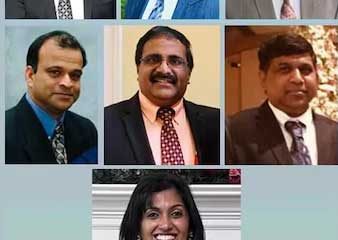
 us news11 months ago
us news11 months agoനോര്ത്ത് അമേരിക്കന് പെന്തക്കോസ്തല് റൈറ്റേഴ്സ് ഫോറം; അറ്റ്ലാന്റാ ചാപ്റ്ററിന് പുതിയ ഭാരവാഹികള്
-

 National11 months ago
National11 months agoബൈബിൾ വിതരണം ചെയ്യുന്നതും നല്ല മൂല്യങ്ങൾ പഠിപ്പിക്കുന്നതും മതപരിവർത്തനമല്ല: അലഹബാദ് ഹൈക്കോടതിയുടെ നിര്ണ്ണായക വിധി
-

 world news10 months ago
world news10 months ago50 രാജ്യങ്ങളിലേക്ക് കുവൈത്ത് പൗരന്മാർക്ക് വിസയില്ലാതെ സഞ്ചരിക്കാം
-

 National5 months ago
National5 months agoനെയ്തേലിപ്പടി ക്രൂസേഡിന് അനുഗ്രഹീത സമാപ്തി
-

 Life11 months ago
Life11 months agoസൂര്യനെ ലക്ഷ്യമിട്ട് കുതിച്ച് ആദിത്യ എൽ1; ഇന്ത്യയുടെ ആദ്യ സൗരദൗത്യം വിജയകരം
-

 National9 months ago
National9 months agoPentecostal mission center demolished in India; pastor, 17 others arrested
-

 Life10 months ago
Life10 months agoമനുഷ്യന് താമസിക്കാന് ചന്ദ്രനില് വീടുകള്; നാസ 3ഡി പ്രിന്ററുകള് ചന്ദ്രനിലേക്കയക്കും
-

 Sports6 months ago
Sports6 months agoMichigan Head Coach Jim Harbaugh Reveals ‘Mini Revival’, 70 Players Baptized Last Season
























